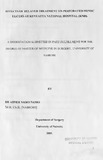| dc.description.abstract | Background: Perforations complicate up to 5-10% of peptic ulcer diseases1.
Mortality following peptic ulcer perforation can peak 29% 2, 3. Of the factors
that influence the outcome of peptic ulcer perforation, treatment delay is
most important and modifiable. This study reviewed delay and how it
affected outcome in patients treated for perforated peptic ulcers at the
Kenyatta National Hospital.
Methods: Patient’s files for the period January 2002 to December 2007 were
reviewed and direct interviews carried out for patients seen from January to
December 2008. Data sought included patient demographics, clinical
presentation, time from symptom onset to presentation at casualty, time from
presentation at casualty to surgical treatment and the treatment outcomes.
The primary endpoint was mortality. Secondary endpoints included wound
infection, wound dehiscence, length of hospital stay, discharge from hospital
and associations between delay, age and gender. Data were entered using a
structured data sheet /questionnaire. The effect of delay as a determinant of
outcome was evaluated using univariate analysis.
Results: One hundred and ninety three patients were evaluated. File reviews
were done for 151 patients treated between January 2002 and December
2007. Forty two patients were interviewed by the researcher during the
period January to December 2008. Twenty four patients (12.4%) died. Sixty
one patients (31.6%) developed complications post-operatively. Thirty
patients were re-operated for the complications. No patient treated within 24
hours died. Complications rate was 0 %, 1.5% and 29.5% for patients treated
within 24 hours, 24-48 hours and after 48 hours respectively. Delay >48
hours was significantly associated with increased mortality (p value
<0.001), morbidity (p value <0.001), and surgical site infections (p value
<0.001). The mean length of hospital stay for patients with delay <48 hours
and over 48 hours was 7.22 (+ 1.9) and 19.7 days (+ 19.1) respectively
(p<0.001) There was however no significant association between delay of
over 48 hours and site of perforation (p= 0.116), and non infectious
complications (p = 0.566).
Conclusion: Delay of more than 48 hours is associated with high morbidity
and mortality. Efforts should be made to reduce the amount of pre-treatment
delay to less than forty eight hours. | en |

